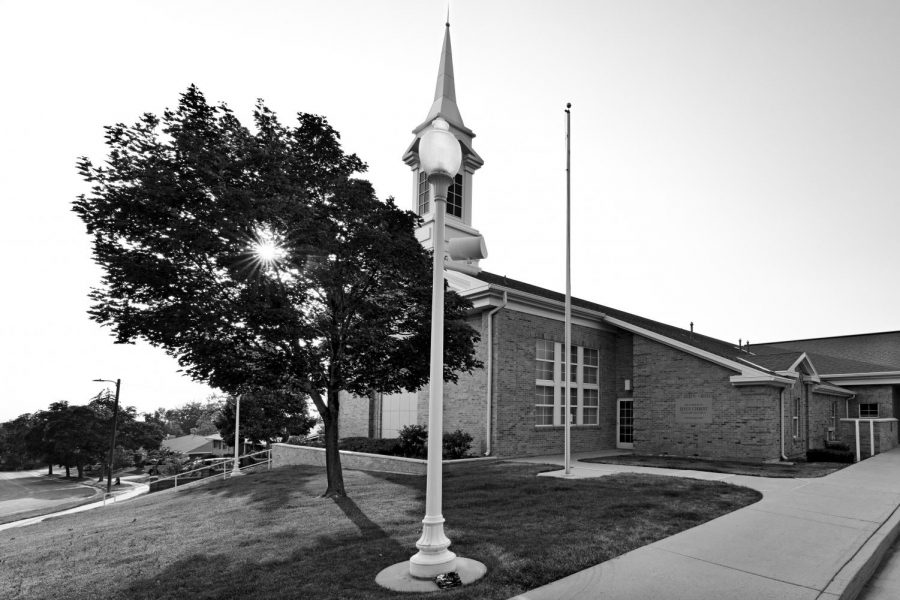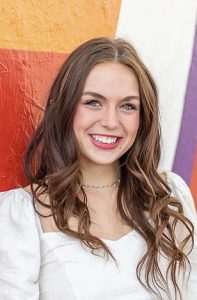U Community Reacts to LDS Apostle BYU Address Concerning LGBT Community
Local Mormon church near Foothill Drive on Sunday, July 11, 2021. (Photo by Kevin Cody | The Daily Utah Chronicle)
September 12, 2021
On Aug. 23, 2021, Jeffrey R. Holland gave a speech around 67 miles south of the University of Utah at Brigham Young University, highlighting The Church of Jesus Christ of Latter Day Saints’ stance on the LGBTQ+ community.
Holland, one of the Twelve Apostles of the LDS Church, quoted a speech given by Elder Oaks in 2014. The speech discusses musket fire in the sense of learning, turning to address the controversial issue of marriage being “a union between a man and a woman.”
He continues, quoting the line “a house divided against itself … cannot stand,” implying the academic mission of the Church.
Holland referenced the 2019 BYU Valedictorian Matt Easton, a man who came out as gay in his convocation speech.
“What might another speaker feel free to announce the next year until eventually, anything goes?” he then said. “What might commencement come to mean — or not mean — if we push individual license over institutional dignity for very long?”
Holland said they have to be careful that love and empathy is not confused for advocacy for the LGBTQ+ community. He continued to describe the need for defenders of the Church and its doctrine and that “friendly fire” has been “wounding students and the parents of students who are confused about what so much recent flag-waving and parade-holding on this issue means.”
U Student Alexis Reid, a questioning member of the LDS church and a member of the LGBTQ+ community, said she felt disappointed after hearing the speech.
“The whole point of Mormonism or what it’s supposed to be is love and Christ, and he loved everyone perfectly and died for our sins,” she said. “Even if LGBTQ people [are] sinners that doesn’t give you the right to judge them.”
She also noted the distasteful rhetoric of “musket fire,” in Holland’s speech, referring to the death of Kylen Carrol and Crystal Michelle Turner, a lesbian couple who were shot to death near Grand County just days before.
“Even if your intention is not to cause violence or hatred, that’s what it’s doing,” Reid said.
She expressed how the U has been a safer place for her and the resources in the area.
“BYU has never been a safe place for LGBTQ+ people … I think they need to take these steps, getting new representatives and changing their code of conduct and accepting LGBTQ+ people, and adding LGBTQ+ people to the board,” she said. “Even if they think it’s against the religion, it’s important to listen.”
Reid expressed her internal conflict with the LDS religion.
“I don’t know how I can support that organized part of it when it’s causing so much violence and oppression against a community that I am also a part of,” she said. “It’s been a long history of oppression towards different groups of people.”
She said she empathizes with those struggling at BYU, particularly members of the LGBTQ+ community, wishing safety upon them.
“Don’t come out, you don’t have to and you don’t owe that to anyone,” she said. “For a lot of people coming out is unsafe, so to say it’s necessary is like guilting people into coming out which is not right. It’s a personal decision.”
She expressed how she had a difficult coming out experience herself.
Bree Peacock, office manager of the LGBT Resource Center, said the center is open and willing to help anyone struggling with safety and sexuality.
“The LGBT Resource Center empowers lesbian, gay, bisexual, transgender, queer, questioning, intersex, asexual/aromantic (LGBTQIA+) students to grow as leaders and learners by supporting students in navigating university systems, exploring their identities, finding community, and developing as leaders with a social justice lens,” said Peacock in an email interview. “Too often we feel like we have to struggle alone, but there are resources available to students for finding community, mental health support, wellness, financial and basic needs support, etc.”
While the resource center doesn’t have everything, Peacock said they can be a stepping stone to connect students with others.
“If someone isn’t sure where to look for resources or how to get started, they can always ask to meet with our staff and we can help connect them to resources,” she said. “We do take privacy very seriously in our office, and we protect student information.”
She also expressed her knowledge of the intersection between faith and the LGBTQ+ community in Utah and said the LGBT Resource Center is willing to assist anyone struggling in this area as well as others.
“I think having an LGBT Resource Center on our campus is important because we foster ways for students to receive support, find community, and develop as leaders as LGBTQIA+ people, as their holistic selves,” she said. “Research shows us that LGBTQIA+ students who have a community of peers and mentors who affirm their identity do better overall: they have better health outcomes, they are more likely to graduate and meet other goals in their lives [and] they have stronger sense of self-acceptance.”









Stephen Fredrick • Sep 21, 2021 at 11:25 pm
I feel that this is a very poor representation of how the “U Community Reacted” to Elder Hollands talk. Brigham Young University has a deep love for ALL. It’s core values are centered around Christ and how we can all become more like him. BYU is NOT the University of Utah and it will never be. This article is bias and does not shed any light on the true meaning of his speech.
John Hedberg • Sep 17, 2021 at 9:03 pm
If the U Community genuinely believes in diversity, equity, and inclusion, why is it not OK to be Euro-American, male, Christian, old, straight, or anything else you find yourself to be as a human being in this “enlightened” campus society? My education trained me to believe with Dr. King that the purpose of social justice was to raise everybody to receive the same high standard of love, openness, respect, appreciation, understanding, and acceptance regardless of how other people chose to identify, as long as we’re not hurting anyone or (hopefully) ourselves. Yet again and again, students on this campus are being told that they’re bigots because of how they were born or for what they believe, that their very presence is triggering those around them simply because they’re diverse from those who insist on “identifying” them in hateful terms, which Dr. King’s generation would have defined as discrimination, and even harassment.
Let all of us know when the “U Community” has matured enough that we truly treat everyone equally with love whether they’re men or women, straight or gay or indeterminate, regardless of what language they speak at home or where their families originated, what color skin or hair or eyes they may present, of how they worship God or respect all life. As a student, I find myself constantly bombarded with messages saying what I am, as well as who I choose to be, is somehow wrong or worth less or even detrimental, simply because someone who once looked like me or spoke similar words might not have behaved well or treated everyone around them with proper humanity. Meanwhile, those who act most offended by their own intolerance and hatred often turn out to be the very people who shout loudest that hatred is wrong, and those who claim they preach diversity and inclusion are the very first to turn away people of a different “identity” and label them, mistreat them, and make them feel unwelcome simply for being who they are, just like you and everyone else.
The U Community has yet to grow up when students here face months of on-campus harassment, yet when they finally bring it up to university Social Justice officials, they’re told “it’s probably a good thing when it happens to someone like you”, as if someone’s identity somehow makes a person less human and less worthy of love, friendship, and respect, which is the very prejudice social justice was created to end. I’ve seen it happen more than once, aided and abetted by school officials, and I still wonder as a consequence whether Lauren McCluskey might have been listened to with more credibility if she’d “looked” more at risk because of her identity, and simply been seen and believed as another human being in need, rather than someone who was left to face abuse alone when no one thought she mattered enough to respond.
Are the Mormons an imperfect mess of their own biases and misconceptions? Sure! The more they believe in their own perfection, the farther they travel from it in their behavior, and that description fits everyone equally well, which is why everyone should be treated equally well. Based on the actual behavior of the U Community in my experience here on campus, maybe humility and accountability and change might begin just as appropriately here at “home” on our own ground, as excited as the usual arbitrary finger-pointers like to be toward our rival school, who are no better or worse than we are, our equals in worth, fallibility, love, and forgiveness on every level as we all strive to become more consonant with whatever “better angels” we can find and nurture in whatever may pass for a “soul” inside each one of us, however you want to “identify” it.
We can all be a little more astute and caring! 🙂
All the Best, With Love,
J Hedberg
Elizabeth • Sep 17, 2021 at 12:20 am
I decided to do a little research of my own here, because I suspected this article gave a very tinted view of Holland’s speech.
This is what I noticed:
The “musket fire” comment was taken out of context here. It had nothing to do with the murder of a lesbian couple and instead everything to do with defending the LDS religion. You may associate musket fire with murder, but the context makes it clear that was not the intent.
There is a theme of “Don’t Ask, Don’t Tell” in this talk, but that has been the rule for BYU since it was predicated. This is not new. Additionally, this makes up only a fraction of the whole address.
We may be disgusted with BYU because it is our rival school (and because we recently lost a significant football game to them). This does not give us the right to point at them, saying they are wrong, especially when our own efforts to protect and support LGBT+ are not perfect.
In the divided political climate we live in, it might be best to let things like an address given at a different school, however offended we may be about it, fall to the wayside and instead work on bettering ourselves and supporting our associates.
Michael Watkins • Sep 16, 2021 at 10:28 pm
Not a very balanced “reaction of the U community” unfortunately. I’m part of this community, I have read Elder Holland’s message carefully, and I think he did just fine in his address. I support his efforts.
It was given to a specific audience—BYU faculty and community—and is a call to be more vocal in support of our belief that “marriage between a man and a woman is ordained of God and that the family is central to the Creator’s plan for the eternal destiny of His children.” See, The Family: A Proclamation to the World.
nina tryggvason • Sep 13, 2021 at 9:30 am
sexuality varies across the human species
over time and all cultures
religion is an invention to separate groups of people